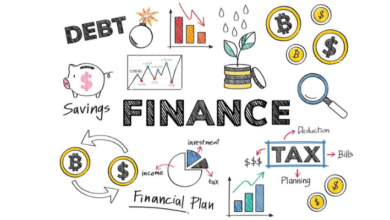Financial Success with Personal Finances: An All-Inclusive Guide

Here is your all-inclusive guide to becoming a personal finance guru! This post can assist you whether you’re just getting started with money matters or want to improve your money management abilities. We’ll go over everything you need to know to take charge of your financial destiny, from investing and budgeting to retirement planning and estate administration.
Table of Contents
ToggleWhat is Personal Finance?

Personal finance refers to the methods and approaches people employ to successfully manage their finances. In order to reach financial objectives and guarantee long-term stability, it entails budgeting, saving, investing, and future planning.
Why is Personal Finance Important?
In order to achieve financial security and freedom, it is imperative that one understands personal finance. People who understand personal finance principles can minimize debt, accumulate wealth, and face financial obstacles head-on.
Feature Table of Personal Finance
Feature | Description |
Helps track income and expenses, enabling effective allocation of funds for financial goals. | |
Investment Opportunities | Gives access to a range of investing options, including mutual funds, equities, and bonds. |
Retirement Planning | Offers strategies and vehicles for saving and investing towards a comfortable retirement. |
Debt Management | Provides tools and techniques for managing and reducing debt burden effectively. |
Insurance Coverage | Offers protection against unforeseen events and liabilities through various insurance policies. |
Tax Planning | Helps optimize tax savings through deductions, credits, and tax-efficient investment strategies. |
Estate Planning | Facilitates the distribution of assets and protection of legacy through wills and trusts. |
Financial Education | Offers resources and guidance for improving financial literacy and making informed decisions. |
Budgeting and Financial Planning
Making a budget is the first step to becoming an expert in personal finance. Analyze your earnings and outgoings first, and then set aside money for necessities like groceries, housing, and utilities. Remember to save money for long-term objectives and emergencies.
Long-Term Financial Goals
To maintain focus and motivation on your financial journey, you must set long-term financial goals. Decide what your priorities are and make a plan to reach them, whether it’s building an emergency fund, supporting your children’s school, or saving for retirement.
Types of Debt
Not every debt is made equally. Discover the various forms of debt, such as mortgages, student loans, and consumer debt, and create plans for controlling and lowering your debt load.
Debt Repayment Strategies
Examine many approaches to paying off debt, including debt consolidation, the avalanche method, and the snowball method. Decide which strategy best suits your financial circumstances, then make a commitment to paying off your debts in a methodical manner.
Investment Strategies
One effective strategy for gradually increasing money is investing. Develop a diverse investment portfolio that is suited to your risk tolerance and financial objectives by learning about several investing options, such as stocks, bonds, and mutual funds.
Risk Management
Reduce investing risk by allocating your assets wisely,personal financial management diversifying your holdings, and giving your investment horizon some thought. You may reduce risk and increase profits by diversifying your investments among a number of asset classes and keeping an eye on the long term.
Types of Insurance
Insurance protects against unanticipated costs and obligations, making it an essential part of financial planning. Examine several insurance options, such as life, health, and property and liability insurance, and make sure you have the protection you require to protect your financial future.
Evaluating Insurance Needs
By performing a coverage analysis and comparing the advantages and disadvantages of different insurance alternatives, you can determine your insurance needs. To make sure your coverage is still sufficient when your circumstances change, periodically review the conditions of your policy.
Pros and Cons:
Pros:
- Helps you gain control over your finances by tracking income and expenses.
- Enables you to prioritize spending and allocate funds towards your financial goals.
- Provides a clear roadmap for achieving long-term financial stability and success.
- Reduces stress by preventing overspending and ensuring you have funds set aside for emergencies.
- Encourages responsible financial habits and fosters discipline in managing money.
Cons:
- Requires time and effort to create and maintain a budget.
- Can be challenging to stick to a budget, especially when faced with unexpected expenses or temptations to overspend.
- May require sacrifices in discretionary spending in order to achieve financial goals.
- Budgeting alone may not address underlying financial issues such as excessive debt or insufficient income.
- Requires ongoing monitoring and adjustment to account for changes in income, expenses, and financial goals.
Tax Deductions and Credits
Utilize tax credits and deductions to reduce your taxable income and increase your savings. Examine ways to save taxes on homeownership advantages, education costs, and retirement contributions.
Tax-Efficient Investment Strategies
Make the most of tax efficiency in your investing strategy by employing tactics for charitable giving, managing capital gains and losses, and taking use of tax-advantaged accounts. You may keep more of your hard-earned money working for you if you practice diligent tax planning.
Retirement Savings Vehicles
Investigate retirement savings options including individual retirement accounts (IRAs), pension plans, and 401(k) plans to ensure a safe retirement. To increase your savings, make consistent contributions to your retirement accounts and make use of employer-matched contributions.
Create a retirement income plan that will support your requirements and keep you financially independent in retirement. In order to establish a steady source of income in retirement, take into account elements like Social Security benefits, annuities, and withdrawal tactics.
With a thorough estate plan, you can safeguard your legacy and make sure your desires are followed. Create trusts and wills to plan for your heirs’ financial security, provide guardianship for small children, and specify how your inheritance will be distributed.
To expedite the transfer of your assets and save expenses and delays for your heirs, consider probate avoidance techniques such joint ownership, beneficiary designations, and estate tax preparation.
Financial Education and Literacy
Importance of Financial Literacy
Financial literacy empowers individuals to make informed financial decisions and avoid common pitfalls. Learn why financial education is essential for achieving financial independence and security.
Resources for Financial Education
Take advantage of resources such as books, online courses, and financial advisors to enhance your financial knowledge and skills. Invest in your financial education to unlock new opportunities and achieve your financial goals.
Steps:
Assess Your Current Financial Situation:
- Compile data regarding your earnings, outlays, possessions, and debts.
- Use tools such as budgeting apps or spreadsheets to track your finances.
Set Financial Goals:
- Determine short-term, medium-term, and long-term financial objectives.
- Prioritize goals such as paying off debt, saving for emergencies, or investing for retirement.
Create a Budget:
- Set aside a portion of your salary for savings, discretionary expenditures, and necessities.
- Adjust your budget as needed to align with your financial goals and priorities.
Develop a Debt Repayment Plan:
- Identify all outstanding debts and prioritize them based on interest rates or balances.
- Choose a debt repayment strategy such as the snowball method or avalanche method.
- Commit to making regular payments and avoiding additional debt.
Explore Investment Opportunities:
- Research different investment options such as stocks, bonds, mutual funds, or real estate.
- When choosing investments, take your financial objectives, investment horizon, and risk tolerance into account.
- Diversify your portfolio to spread risk and maximize returns over time.
Evaluate Insurance Needs:
- Assess your insurance coverage for health, life, property, and liability.
- Determine if you have adequate coverage to protect against unforeseen events and risks.
Implement Tax Planning Strategies:
- Profit from credits, tax deductions, and tax-favored investment accounts.
- Consider consulting with a tax advisor to optimize your tax-saving opportunities.
Plan for Retirement:
- Estimate your retirement expenses and income needs.
- Contribute regularly to retirement savings vehicles such as 401(k) plans or IRAs.
- Develop a retirement income strategy to ensure financial security in your golden years.
Establish an Estate Plan:
- Create essential estate planning documents such as wills and trusts.
- Designate beneficiaries for your assets and specify your wishes for estate distribution.
- Review and update your estate plan regularly to reflect changes in your circumstances or preferences.
Continue Financial Education:
- Stay informed about personal finance topics through books, articles, and online resources.
- Seek advice from financial professionals or attend workshops and seminars to enhance your knowledge and skills.
- Stay proactive in managing your finances and adapting to changes in the economic landscape.
Conclusion:
Congratulations on completing your journey through mastering personal finance! By implementing the strategies and techniques outlined in this guide, you can take control of your financial future and build a life of financial freedom and security. Remember, financial success is within reach – all it takes is dedication, discipline, and a commitment to lifelong learning. Start your journey today and reap the rewards for years to come.
FAQs:
What is the first step in mastering personal finance?
The first step is creating a budget to track your income and expenses, allowing you to allocate funds effectively and prioritize your financial goals.
How can I reduce my debt burden?
Consider debt repayment strategies such as the snowball method or avalanche method, and explore options for consolidating your debts to lower interest rates and streamline payments.
What are the benefits of investing?
Investing can help you build wealth over time through the power of compounding returns. It provides an opportunity to grow your money and achieve your long-term financial goals.
How can I minimize investment risk?
Mitigate risk by diversifying your investment portfolio across different asset classes, maintaining a long-term perspective, and regularly reviewing and adjusting your investments as needed.
Why is insurance important in financial planning?
Insurance provides protection against unexpected events and liabilities that could derail your financial progress. It safeguards your assets and ensures financial stability for you and your loved ones.
How can I optimize my tax savings?
Take advantage of tax deductions and credits, contribute to tax-advantaged retirement accounts, and implement tax-efficient investment strategies to minimize your tax liability and maximize savings.
When should I start planning for retirement?
It’s never too early to start planning for retirement. The earlier you begin saving and investing, the more time your money has to grow, increasing your chances of achieving a comfortable retirement.
What is estate planning, and why is it important?
Estate planning involves creating a plan for the distribution of your assets and the protection of your legacy after you pass away. It ensures your wishes are carried out and minimizes confusion and disputes among your heirs.
How can I improve my financial literacy?
Invest in your financial education by reading books, taking online courses, and seeking guidance from financial advisors. Continuously educate yourself to enhance your knowledge and skills in managing your finances.
Where can I find additional resources for financial education?
Explore reputable websites, attend financial workshops and seminars, and consider consulting with certified financial planners or advisors to access a wealth of knowledge and guidance on personal finance topics.




